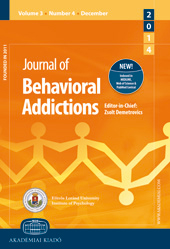The impact of heavy and disordered use of games and social media on adolescents’ psychological, social, and school functioning
The impact of heavy and disordered use of games and social media on adolescents’ psychological, social, and school functioning
Author(s): Regina van den Eijnden, Ina M. Koning, Suzan Doornwaard, Femke van Gurp, Tom ter BogtSubject(s): Behaviorism
Published by: Akadémiai Kiadó
Keywords: game addiction; social media addiction; psychosocial well-being; school functioning; adolescents; consequences
Summary/Abstract: To extend the scholarly debate on (a) whether or not the compulsive use of games and social media should be regarded as behavioral addictions (Kardefelt-Winther et al., 2017) and (b) whether the nine DSM-5 criteria for Internet gaming disorder (IGD; American Psychiatric Association [APA], 2013) are appropriate to distinguish highly engaged, non-disordered users of games and social media from disordered users, this study investigated the impact of engaged and disordered use of games and social media on the psychosocial well-being and school performances of adolescents. Methods. As part of the Digital Youth Project of the University of Utrecht, a three-wave longitudinal sample of 12- to 15-year-old adolescents (N = 538) was utilized. Three annual online measurements were administered in the classroom setting, including IGD, social media disorder, life satisfaction, and perceived social competence. Schools provided information on students’ grade point average. Results. The symptoms of disordered use of games and social media showed to have a negative effect on adolescent’s life satisfaction, and the symptoms of disordered gaming showed a negative impact on adolescents’ perceived social competence. On the other hand, heavy use of games and social media predicted positive effects on adolescents’ perceived social competence. However, the heavy use of social media also predicted a decrease in school performances. Several gender differences in these outcomes are discussed. Conclusion. The findings propose that symptoms of disordered use of games and social media predict a decrease in the psychosocial well-being and school performances of adolescents, thereby meeting one of the core criteria of behavioral addictions.
Journal: Journal of Behavioral Addictions
- Issue Year: 7/2018
- Issue No: 3
- Page Range: 697-706
- Page Count: 10
- Language: English

